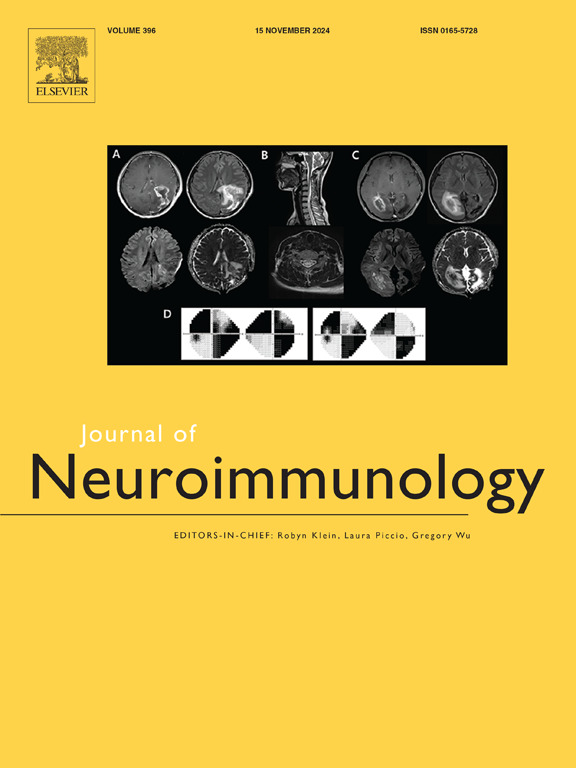利妥昔单抗治疗抗体阳性小纤维神经病5例疗效观察
IF 2.9
4区 医学
Q3 IMMUNOLOGY
引用次数: 0
摘要
背景,目的:我们评估了利妥昔单抗在常规治疗和免疫治疗无效的抗ts - hds、抗fgfr3和抗丛蛋白D1小纤维神经病变(SFN)患者中的疗效。方法我们回顾了111例确诊为SFN的患者,其中83例确诊为SFN, 9例TS-HDS、FGFR3或丛状蛋白d1抗体阳性,并接受了对症治疗,此外还进行了静脉注射免疫球蛋白(IVIg)和/或皮质类固醇的试验。5例无效患者给予利妥昔单抗(2次静脉输注1 g,间隔2周)。比较临床参数和问卷调查结果。结果抗ts - hds阳性2例,抗丛蛋白D1阳性1例,抗fgfr3抗体阳性2例。采用流式细胞术检测循环CD19+ B细胞水平,评价治疗效果。在利妥昔单抗输注前、输注后4周和4个月分别获得临床问卷,包括视觉模拟量表(VAS)、Rasch转化13项SFN症状量表(RT-SFN-SIQ)、小纤维神经病特异性Rasch构建整体残疾量表(SFN- rods)和复合自主神经症状量表(COMPASS-31)。在使用利妥昔单抗后4个月,VAS明显改善,而RT-SFN-SIQ和SFN-RODS也有改善的趋势。指南针-31分数保持不变。本研究阐明了抗cd20单克隆抗体在抗体相关免疫SFN中的疗效和潜在作用,特别是在那些对IVIg或皮质类固醇无效的患者中。需要进一步的随机对照试验和更大的前瞻性研究来确定利妥昔单抗对血清阳性SFN患者的有效性和安全性。本文章由计算机程序翻译,如有差异,请以英文原文为准。
Efficacy of rituximab on antibody-positive small fiber neuropathy: A series of 5 cases
Background & aims
We evaluated the efficacy of rituximab in patients with anti-TS-HDS, anti-FGFR3 and anti-plexin D1 small fiber neuropathy (SFN) who failed to respond to conventional treatments and immunotherapy.
Methods
We reviewed 111 patients diagnosed with SFN - 83 definite SFN, 9 had positive antibody titers towards TS-HDS, FGFR3 or plexin-D1 and received symptomatic treatment, in addition to trials of intravenous immunoglobulin (IVIg) and/or corticosteroids. Five patients who failed to respond were offered rituximab (two intravenous 1 g infusions, two weeks apart). Clinical parameters and questionnaires were compared.
Results
Two patients were positive for anti-TS-HDS, one for anti-plexin D1 and two for anti-FGFR3 antibodies. Therapeutic efficacy was assessed by circulating CD19+ B cell levels with flow cytometry. Clinical questionnaires, including Visual Analogue Scale (VAS), Rasch Transformed 13-item SFN Symptom Inventory Quotient (RT-SFN-SIQ), Small Fiber Neuropathy-specific Rasch-built overall disability scale (SFN-RODS) and the Composite Autonomic Symptom Scale (COMPASS-31) were obtained prior to rituximab infusion, and at 4 weeks and 4 months post-infusion. Significantly improved VAS was seen at 4 months after rituximab, while a trend towards improvement was seen in RT-SFN-SIQ, and SFN-RODS. COMPASS-31 score remained static.
Interpretation
This study illustrates the efficacy and potential role of anti-CD20 monoclonal antibody in antibody-associated immune SFN, especially in those who fail to respond to IVIg or corticosteroid. Further randomized controlled trials and larger prospective studies are needed to determine the effectiveness and safety of Rituximab in seropositive patients with SFN.
求助全文
通过发布文献求助,成功后即可免费获取论文全文。
去求助
来源期刊

Journal of neuroimmunology
医学-免疫学
CiteScore
6.10
自引率
3.00%
发文量
154
审稿时长
37 days
期刊介绍:
The Journal of Neuroimmunology affords a forum for the publication of works applying immunologic methodology to the furtherance of the neurological sciences. Studies on all branches of the neurosciences, particularly fundamental and applied neurobiology, neurology, neuropathology, neurochemistry, neurovirology, neuroendocrinology, neuromuscular research, neuropharmacology and psychology, which involve either immunologic methodology (e.g. immunocytochemistry) or fundamental immunology (e.g. antibody and lymphocyte assays), are considered for publication.
 求助内容:
求助内容: 应助结果提醒方式:
应助结果提醒方式:


